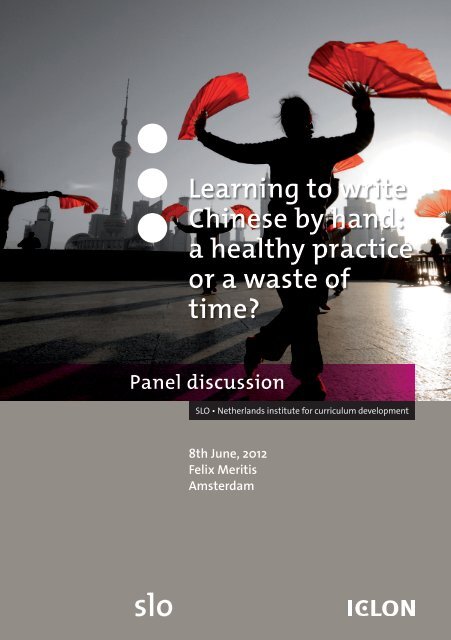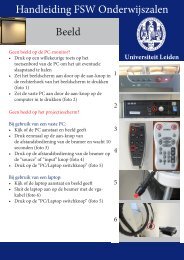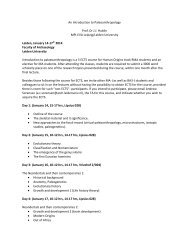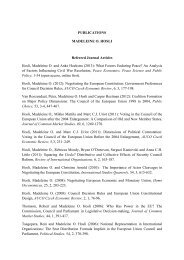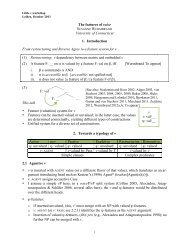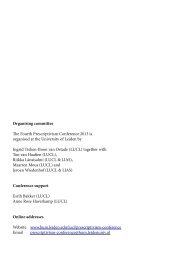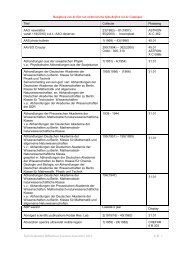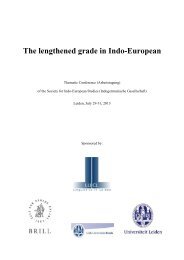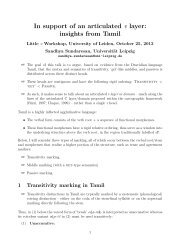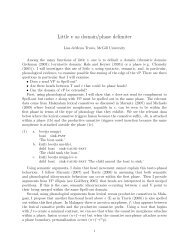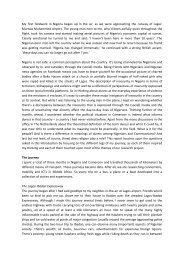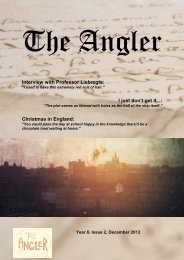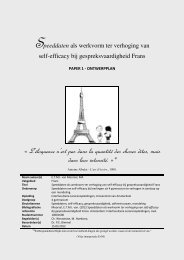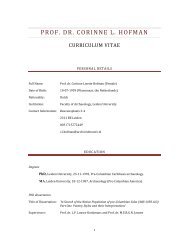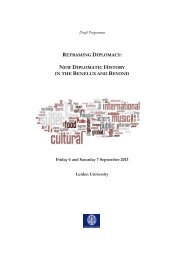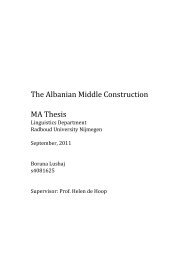Learning to write Chinese by hand: a healthy practice or a waste of ...
Learning to write Chinese by hand: a healthy practice or a waste of ...
Learning to write Chinese by hand: a healthy practice or a waste of ...
You also want an ePaper? Increase the reach of your titles
YUMPU automatically turns print PDFs into web optimized ePapers that Google loves.
<strong>Learning</strong> <strong>to</strong> <strong>write</strong><br />
<strong>Chinese</strong> <strong>by</strong> <strong>hand</strong>:<br />
a <strong>healthy</strong> <strong>practice</strong><br />
<strong>or</strong> a <strong>waste</strong> <strong>of</strong><br />
time?<br />
Panel discussion<br />
SLO • Netherlands institute f<strong>or</strong> curriculum development<br />
8th June, 2012<br />
Felix Meritis<br />
Amsterdam<br />
1 | <strong>Learning</strong> <strong>to</strong> <strong>write</strong> <strong>Chinese</strong> <strong>by</strong> <strong>hand</strong>: a <strong>healthy</strong> <strong>practice</strong> <strong>or</strong> a <strong>waste</strong> <strong>of</strong> time?
Organizing committee<br />
SLO Daniela Fasoglio seni<strong>or</strong> curriculum developer<br />
project manager Dutch <strong>Chinese</strong> Pilot<br />
Anne Beeker seni<strong>or</strong> curriculum developer<br />
c<strong>or</strong>e team Dutch <strong>Chinese</strong> Pilot<br />
Josephine van den Graven project assistant<br />
Iclon Alessandra C<strong>or</strong>da co<strong>or</strong>dina<strong>to</strong>r National Centre f<strong>or</strong> Modern<br />
Languages<br />
c<strong>or</strong>e team Dutch <strong>Chinese</strong> Pilot<br />
Claire Smulders teacher trainer <strong>of</strong> <strong>Chinese</strong> at Iclon Graduate<br />
School <strong>of</strong> Teaching<br />
c<strong>or</strong>e team Dutch <strong>Chinese</strong> Pilot<br />
2 | <strong>Learning</strong> <strong>to</strong> <strong>write</strong> <strong>Chinese</strong> <strong>by</strong> <strong>hand</strong>: a <strong>healthy</strong> <strong>practice</strong> <strong>or</strong> a <strong>waste</strong> <strong>of</strong> time?
Introduction<br />
Writing <strong>Chinese</strong> characters <strong>by</strong> <strong>hand</strong> <strong>or</strong> electronically is a challenging discussion<br />
<strong>to</strong>pic, not only in the Netherlands but also internationally. What is the<br />
pedagogical value <strong>of</strong> teaching pupils how <strong>to</strong> <strong>write</strong> characters <strong>by</strong> <strong>hand</strong>? Does<br />
this activity enhance pupils’ pr<strong>of</strong>iciency in the <strong>Chinese</strong> language, especially<br />
in reading? Is it w<strong>or</strong>th spending a lot <strong>of</strong> time on <strong>hand</strong>-writing in the initial<br />
stages <strong>of</strong> their language learning process? Especially keeping in mind the<br />
relatively small amount <strong>of</strong> teaching hours available? How should <strong>Chinese</strong><br />
writing skills be taught and assessed in secondary education?<br />
A group <strong>of</strong> specialists from Belgium, France, Germany, Great Britain and the<br />
Netherlands are coming <strong>to</strong>gether in Amsterdam <strong>to</strong>day in <strong>or</strong>der <strong>to</strong> discuss<br />
these <strong>to</strong>pics. Different viewpoints will be compared, various arguments will<br />
be <strong>of</strong>fered in an attempt <strong>to</strong> find mutually shared answers and recommendations.<br />
We wish you a stimulating and pleasant day.<br />
The <strong>or</strong>ganizing committee<br />
3 | <strong>Learning</strong> <strong>to</strong> <strong>write</strong> <strong>Chinese</strong> <strong>by</strong> <strong>hand</strong>: a <strong>healthy</strong> <strong>practice</strong> <strong>or</strong> a <strong>waste</strong> <strong>of</strong> time?
The Dutch Pilot<br />
<strong>Chinese</strong> as a school subject is increasingly popular in quite a few European<br />
countries, among which the Netherlands.<br />
In 2009 the Netherlands Institute <strong>of</strong> Curriculum Development (SLO) wrote<br />
a curriculum proposal as a first step <strong>to</strong>wards the introduction <strong>of</strong> <strong>Chinese</strong><br />
Language and Culture as a regular school subject in Dutch secondary<br />
education. In 2010 the Dutch Ministry <strong>of</strong> Education allocated a subsidy <strong>to</strong><br />
a three-year pilot project in <strong>or</strong>der <strong>to</strong> gather data on attainability, feasibility<br />
and testability <strong>of</strong> the proposed learning contents and target goals. At the<br />
moment, nine secondary schools participate in this project, the results <strong>of</strong><br />
which will be published at the end <strong>of</strong> 2013.<br />
In June 2011 a <strong>Chinese</strong> language assessment test was carried out in the<br />
fourth f<strong>or</strong>m <strong>of</strong> the pilot schools. The results showed that on average an A1<br />
pr<strong>of</strong>iciency level had been achieved <strong>by</strong> the students f<strong>or</strong> speaking, listening<br />
and reading, but not f<strong>or</strong> writing. A significant difference was found, <strong>to</strong>o,<br />
between writing <strong>Chinese</strong> characters using pinyin as input on the computer<br />
(and then select the right character from the drop-down list) and writing<br />
characters <strong>by</strong> <strong>hand</strong>.<br />
4 | <strong>Learning</strong> <strong>to</strong> <strong>write</strong> <strong>Chinese</strong> <strong>by</strong> <strong>hand</strong>: a <strong>healthy</strong> <strong>practice</strong> <strong>or</strong> a <strong>waste</strong> <strong>of</strong> time?
Programme<br />
10.30 Registration and c<strong>of</strong>fee<br />
11.00 Introduction<br />
Sh<strong>or</strong>t outline <strong>of</strong> the Dutch <strong>Chinese</strong> pilot project<br />
Reason and purpose <strong>of</strong> the meeting<br />
11.25 Panel discussion<br />
Question 1<br />
a) reviewers<br />
b) panel discussion<br />
c) questions from the flo<strong>or</strong><br />
12.25 Lunch<br />
13.15 Panel discussion<br />
Question 2<br />
a) reviewers<br />
b) panel discussion<br />
c) questions from the flo<strong>or</strong><br />
14.15 C<strong>of</strong>fee break<br />
14.30 Panel discussion<br />
Question 3<br />
a) reviewers<br />
b) panel discussion<br />
c) questions from the flo<strong>or</strong><br />
Daniela Fasoglio<br />
Modera<strong>to</strong>rs:<br />
Alessandra C<strong>or</strong>da<br />
Daniela Fasoglio<br />
Reviewers:<br />
Joël Bellassen<br />
Tin Chau Tsui<br />
Modera<strong>to</strong>rs:<br />
Alessandra C<strong>or</strong>da<br />
Daniela Fasoglio<br />
Reviewers:<br />
Liesje Geyskens<br />
Claire Smulders<br />
Modera<strong>to</strong>rs:<br />
Alessandra C<strong>or</strong>da<br />
Daniela Fasoglio<br />
Reviewers:<br />
Katharine Carruthers<br />
Jim McDonald<br />
15.30 C<strong>of</strong>fee break<br />
15.45 Conclusions and recommendations Anne Beeker<br />
16.20 Closing <strong>of</strong> the meeting Daniela Fasoglio<br />
5 | <strong>Learning</strong> <strong>to</strong> <strong>write</strong> <strong>Chinese</strong> <strong>by</strong> <strong>hand</strong>: a <strong>healthy</strong> <strong>practice</strong> <strong>or</strong> a <strong>waste</strong> <strong>of</strong> time?
Members <strong>of</strong> the panel<br />
Belgium<br />
Liesje Geyskens<br />
Liesje Geyskens studied <strong>Chinese</strong> at the Sinology<br />
department <strong>of</strong> the University <strong>of</strong> Leuven and at<br />
Nanjing University. While w<strong>or</strong>king as a <strong>Chinese</strong><br />
teacher in the KU Leuven language training centre<br />
f<strong>or</strong> adults, she continued studying at the same<br />
University <strong>to</strong> become a language teacher. She<br />
co-founded the Belgian <strong>Chinese</strong> Teacher Association<br />
(BCLA). Together with colleagues she <strong>or</strong>ganizes<br />
in-service training f<strong>or</strong> <strong>Chinese</strong> teachers (LUCON). At<br />
the moment she teaches <strong>Chinese</strong> <strong>to</strong> the bachel<strong>or</strong><br />
students <strong>of</strong> the Sinology department <strong>of</strong> KU Leuven. She is also active as a<br />
teacher trainer and is co-developing <strong>Chinese</strong> teaching material f<strong>or</strong> Flemish<br />
secondary schools.<br />
Els Hedebouw<br />
Els Hedebouw is a full-time <strong>Chinese</strong> language<br />
teacher in the department <strong>of</strong> sinology at the<br />
Katholieke Universiteit Leuven. She teaches <strong>Chinese</strong><br />
<strong>to</strong> first year sinology students (reading, writing,<br />
grammar and vocabulary) and conducts teacher<br />
training classes f<strong>or</strong> mainly adult education level on<br />
teaching grammar, vocabulary and reading. She is<br />
also w<strong>or</strong>king on a PhD project titled “The processes<br />
<strong>of</strong> collab<strong>or</strong>ative activity in literature circles in<br />
relation <strong>to</strong> language use and text comprehension.<br />
The case <strong>of</strong> Dutch CFL learners’ literature circle discussions <strong>of</strong> <strong>Chinese</strong><br />
texts.” Her maj<strong>or</strong> research interests are <strong>Chinese</strong> f<strong>or</strong>eign language<br />
acquisition and reading in a f<strong>or</strong>eign language. She is co-founder <strong>of</strong> the<br />
Belgian <strong>Chinese</strong> Language Teachers Association (BCLA).<br />
6 | <strong>Learning</strong> <strong>to</strong> <strong>write</strong> <strong>Chinese</strong> <strong>by</strong> <strong>hand</strong>: a <strong>healthy</strong> <strong>practice</strong> <strong>or</strong> a <strong>waste</strong> <strong>of</strong> time?
Members <strong>of</strong> the panel<br />
France<br />
Joël Bellassen<br />
Joël Bellassen has been Inspecteur Général <strong>of</strong> <strong>Chinese</strong><br />
Language Teaching f<strong>or</strong> the Ministry <strong>of</strong> National<br />
Education, France, since 2006. He graduated from<br />
Paris University (PhD, dept <strong>of</strong> <strong>Chinese</strong>, dept <strong>of</strong><br />
Philosophy) and was a student at the Peking<br />
Language Institute and Peking University from 1973 <strong>to</strong><br />
1975. Next he w<strong>or</strong>ked as a <strong>Chinese</strong> language teacher<br />
in secondary education f<strong>or</strong> ten years. He was<br />
Associate Pr<strong>of</strong>ess<strong>or</strong> at the University <strong>of</strong> Paris from<br />
1991 <strong>to</strong> 2000, Pr<strong>of</strong>ess<strong>or</strong> at INALCO from 2000 <strong>to</strong> 2006<br />
and Research Direc<strong>to</strong>r in the field <strong>of</strong> <strong>Chinese</strong> Didactics from 1997 <strong>to</strong> <strong>to</strong>day.<br />
Hon<strong>or</strong>ary president <strong>of</strong> the French <strong>Chinese</strong> Language Teachers’ Association<br />
(president from 1987 <strong>to</strong> 2002); vice-chairman <strong>of</strong> the International Society f<strong>or</strong><br />
<strong>Chinese</strong> Language Teaching from 1993; chief-edi<strong>to</strong>r in charge <strong>of</strong> <strong>Chinese</strong><br />
teaching programmes f<strong>or</strong> secondary schools; auth<strong>or</strong> <strong>of</strong> several publications <strong>of</strong><br />
books, scientific papers, video and cd-rom teaching materials, among others<br />
A Key <strong>to</strong> <strong>Chinese</strong> Speech and Writing, A brief His<strong>to</strong>ry <strong>of</strong> the <strong>Chinese</strong> Language<br />
Teaching in France, Le chinois pour <strong>to</strong>us, etc.<br />
Germany<br />
Henning Klöter<br />
Henning Klöter is Pr<strong>of</strong>ess<strong>or</strong> <strong>of</strong> <strong>Chinese</strong> and Head <strong>of</strong><br />
the <strong>Chinese</strong> Section at the Faculty <strong>of</strong> Translation<br />
Studies, Linguistics and Cultural Studies <strong>of</strong> the<br />
University <strong>of</strong> Mainz (Germany). He studied Sinology<br />
and Linguistics in Trier, Leiden, Peking and Taipei. MA<br />
<strong>Chinese</strong> Languages and Cultures at Leiden University<br />
in 1996. 1998–1999 Edi<strong>to</strong>r and transla<strong>to</strong>r in Taiwan.<br />
2000–2003 research assistant (aio) at Leiden<br />
University, PhD in 2003. 2003–2005 Mandarin<br />
language teacher and research associate at the<br />
Department <strong>of</strong> <strong>Chinese</strong> Languages and Literatures <strong>of</strong> Ruhr University,<br />
Bochum (Germany). 2005–2007 postdoc<strong>to</strong>ral research fellow (NWO/veni) at<br />
the Leiden University Centre f<strong>or</strong> Linguistics. 2007–2009 Assistant Pr<strong>of</strong>ess<strong>or</strong> at<br />
the Graduate Institute <strong>of</strong> International Sinology Studies <strong>of</strong> National Taiwan<br />
N<strong>or</strong>mal University (Taipei). 2003–2009 secretary and executive board<br />
member <strong>of</strong> the European Association <strong>of</strong> <strong>Chinese</strong> Linguistics. 2009–2012<br />
7 | <strong>Learning</strong> <strong>to</strong> <strong>write</strong> <strong>Chinese</strong> <strong>by</strong> <strong>hand</strong>: a <strong>healthy</strong> <strong>practice</strong> <strong>or</strong> a <strong>waste</strong> <strong>of</strong> time?
Members <strong>of</strong> the panel<br />
acting head <strong>of</strong> the Department <strong>of</strong> <strong>Chinese</strong> Languages and Literatures. Since<br />
September 2010 2nd chairman <strong>of</strong> the Association <strong>of</strong> <strong>Chinese</strong> Teachers in<br />
German Speaking Countries.<br />
Great Britain<br />
Katharine Carruthers<br />
Katharine Carruthers is the Direc<strong>to</strong>r <strong>of</strong> the Schools<br />
Netw<strong>or</strong>k (SSAT) Confucius Institute. The Schools<br />
Netw<strong>or</strong>k is a not-f<strong>or</strong>-pr<strong>of</strong>it membership<br />
<strong>or</strong>ganisation which aims <strong>to</strong> raise achievement in<br />
schools in England and internationally.<br />
Katharine has played a leading role in promoting<br />
and developing the study <strong>of</strong> <strong>Chinese</strong> and China<br />
across the curriculum in schools in England.<br />
Katharine is an experienced teacher and examiner<br />
<strong>of</strong> <strong>Chinese</strong>. She is the series edi<strong>to</strong>r <strong>of</strong> the new series<br />
<strong>of</strong> Pearson textbooks f<strong>or</strong> teaching <strong>Chinese</strong> f<strong>or</strong> 11-16 year olds and is Chief<br />
Examiner f<strong>or</strong> Cambridge Pre-U Mandarin <strong>Chinese</strong> and Principal Examiner<br />
f<strong>or</strong> IGCSE Mandarin f<strong>or</strong> Cambridge International Examinations. She is<br />
currently w<strong>or</strong>king with colleagues at the Institute <strong>of</strong> Education, London<br />
University <strong>to</strong> deliver the first year <strong>of</strong> a Postgraduate Certificate <strong>of</strong> Education<br />
(PGCE) course f<strong>or</strong> teachers <strong>of</strong> Mandarin <strong>Chinese</strong>.<br />
Katharine graduated in <strong>Chinese</strong> from Durham University and has an MA<br />
from the School <strong>of</strong> Oriental and African Studies.<br />
Meryl James<br />
Presently Co-<strong>or</strong>dina<strong>to</strong>r <strong>of</strong> the Confucius Classroom<br />
f<strong>or</strong> Edinburgh City and teacher <strong>of</strong> Modern<br />
Languages. Pri<strong>or</strong> <strong>to</strong> this post Development Officer<br />
f<strong>or</strong> Perth and Kinross Council (2002-10) with<br />
responsibility f<strong>or</strong> developing and promoting all<br />
languages <strong>of</strong>fered in schools in Scotland both<br />
primary and secondary. It included the teaching and<br />
the training <strong>of</strong> teachers at all levels. A special focus<br />
was the development <strong>of</strong> materials following<br />
National Guidelines and encouraging diversity <strong>of</strong><br />
languages <strong>of</strong>fered, especially f<strong>or</strong> <strong>Chinese</strong> since 2005/6 in line with the<br />
Government’s National China Policy.<br />
8 | <strong>Learning</strong> <strong>to</strong> <strong>write</strong> <strong>Chinese</strong> <strong>by</strong> <strong>hand</strong>: a <strong>healthy</strong> <strong>practice</strong> <strong>or</strong> a <strong>waste</strong> <strong>of</strong> time?
Members <strong>of</strong> the panel<br />
Jim McDonald<br />
Jim McDonald has been Qualifications Manager f<strong>or</strong><br />
Modern Languages at the Scottish Qualifications<br />
Auth<strong>or</strong>ity (SQA) since July 2004. He has been<br />
responsible f<strong>or</strong> a range <strong>of</strong> modern languages courses<br />
and Awards, including the introduction <strong>of</strong> National<br />
Courses in Can<strong>to</strong>nese and Mandarin in 2008. Bef<strong>or</strong>e<br />
taking up the post <strong>of</strong> QM, he was a principal teacher <strong>of</strong><br />
modern languages, and taught French, German and<br />
Spanish.<br />
Lik Suen<br />
Lik Suen is Principal Lec<strong>to</strong>r in <strong>Chinese</strong> at the China and<br />
Inner Asia Department, University <strong>of</strong> London.<br />
She graduated from Beijing Language University with<br />
a maj<strong>or</strong> in Teaching <strong>Chinese</strong> as a F<strong>or</strong>eign Language.<br />
She has over 20 years’ experience <strong>of</strong> teaching <strong>Chinese</strong><br />
<strong>to</strong> f<strong>or</strong>eign students. She w<strong>or</strong>ked f<strong>or</strong> the <strong>Chinese</strong><br />
University <strong>of</strong> Hong Kong and joined SOAS <strong>Chinese</strong><br />
department in 2002.<br />
Currently she is the Principal Lec<strong>to</strong>r in <strong>Chinese</strong> at SOAS.<br />
She is also a seni<strong>or</strong> examiner <strong>of</strong> <strong>Chinese</strong> language in<br />
several exam boards in the UK. She is the auth<strong>or</strong> <strong>of</strong> several <strong>Chinese</strong> textbooks.<br />
9 | <strong>Learning</strong> <strong>to</strong> <strong>write</strong> <strong>Chinese</strong> <strong>by</strong> <strong>hand</strong>: a <strong>healthy</strong> <strong>practice</strong> <strong>or</strong> a <strong>waste</strong> <strong>of</strong> time?
Members <strong>of</strong> the panel<br />
the Netherlands<br />
Ya Ping (Amy) Hsiao<br />
Ya Ping (Amy) Hsiao w<strong>or</strong>ks as a PhD employee at the<br />
Centre f<strong>or</strong> <strong>Learning</strong> Sciences and Technologies<br />
(CELSTEC) at the Open University <strong>of</strong> the Netherlands<br />
and as a lecturer <strong>Chinese</strong> at Tilburg University. After<br />
her bachel<strong>or</strong> <strong>of</strong> <strong>Chinese</strong> Language & Literature<br />
Education in Taiwan, she completed her masters in<br />
Applied Linguistics at Edinburgh University and<br />
Educational Science and Technology (the track <strong>of</strong><br />
Educational Management, Evaluation and<br />
Assessment) at Twente University.<br />
Amy sets out <strong>to</strong> push the boundaries <strong>of</strong> language education in multiple<br />
directions at once. She dedicates herself <strong>to</strong> three <strong>practice</strong>s <strong>of</strong> teaching<br />
<strong>Chinese</strong> as a f<strong>or</strong>eign language: 1) designing optimal instructions <strong>to</strong> alleviate<br />
learner cognitive load and improve learning efficiency, 2) inc<strong>or</strong>p<strong>or</strong>ating<br />
alternative assessments in<strong>to</strong> classroom activities, and 3) expl<strong>or</strong>ing these<br />
pedagogical <strong>practice</strong>s in technology-enhanced learning environments. Her<br />
website, chinees-leren.nl, not only reflects these <strong>practice</strong>s, but also<br />
promotes <strong>Chinese</strong> language <strong>to</strong> the general public <strong>of</strong> Dutch speakers.<br />
Claire Smulders<br />
Claire Smulders (MA) grew up in Brussels where she<br />
passed her European Baccalaureate at the European<br />
School <strong>of</strong> Uccle. After finishing her studies <strong>of</strong><br />
<strong>Chinese</strong> Language and Culture at Leiden University,<br />
Beijing University and Taiwan N<strong>or</strong>mal University,<br />
she w<strong>or</strong>ked as a researcher at the Law Faculty <strong>of</strong><br />
Utrecht University. In addition <strong>to</strong> being a teacher in<br />
<strong>Chinese</strong> Language and Culture in three Secondary<br />
Schools, she is presently w<strong>or</strong>king as a Pedagogist in<br />
<strong>Chinese</strong> Language and Culture at Leiden University<br />
Graduate School <strong>of</strong> Teaching (ICLON) and is, as such, involved in the<br />
SLO-ICLON Pilot Study “ Chinees op School”.<br />
10 | <strong>Learning</strong> <strong>to</strong> <strong>write</strong> <strong>Chinese</strong> <strong>by</strong> <strong>hand</strong>: a <strong>healthy</strong> <strong>practice</strong> <strong>or</strong> a <strong>waste</strong> <strong>of</strong> time?
Members <strong>of</strong> the panel<br />
Tin Chau Tsui<br />
Tin Chau Tsui, Seni<strong>or</strong> Lecturer <strong>of</strong> <strong>Chinese</strong> language,<br />
Department <strong>of</strong> Oriental Languages and<br />
Communication, Zuyd University <strong>of</strong> Applied<br />
Sciences. First teacher <strong>of</strong> the <strong>Chinese</strong> language in<br />
secondary education in the Netherlands. Auth<strong>or</strong> <strong>of</strong><br />
the teaching method Chinees? Een makkie!<br />
(Zhongwen? Haoxue!, <strong>Chinese</strong>? Easy Peasy!) which<br />
has been published in The Netherlands and Sweden.<br />
Field experience men<strong>to</strong>r <strong>of</strong> the postgraduate<br />
program Master <strong>of</strong> Arts in Teaching <strong>Chinese</strong> as an<br />
International Language, Hong Kong Institute <strong>of</strong> Education.<br />
11 | <strong>Learning</strong> <strong>to</strong> <strong>write</strong> <strong>Chinese</strong> <strong>by</strong> <strong>hand</strong>: a <strong>healthy</strong> <strong>practice</strong> <strong>or</strong> a <strong>waste</strong> <strong>of</strong> time?
12 | <strong>Learning</strong> <strong>to</strong> <strong>write</strong> <strong>Chinese</strong> <strong>by</strong> <strong>hand</strong>: a <strong>healthy</strong> <strong>practice</strong> <strong>or</strong> a <strong>waste</strong> <strong>of</strong> time?


